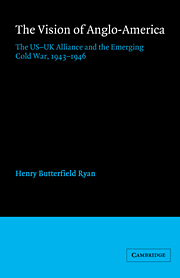Book contents
- Frontmatter
- Contents
- ACKNOWLEDGEMENTS
- INTRODUCTION
- PART I STRENGTHENING THE TIES: THE EFFORT AND THE PROBLEMS
- PART II FOREIGN CRISES THAT DEMONSTRATE GREAT BRITAIN'S PROBLEMS
- INTRODUCTION
- 5 Background and build-up
- 6 Involvement of Great Britain and the United States
- 7 Yalta and after
- 8 Truman: the new factor
- 9 The gathering for the San Francisco Conference
- 10 Between San Francisco and Potsdam
- 11 Concluding thoughts on the Polish crisis
- 12 Background of the crisis
- 13 1944, the critical year
- 14 The role of the press
- 15 The crisis peaks
- 16 America dives in
- CONCLUSION
- NOTES
- BIBLIOGRAPHY
- INDEX
16 - America dives in
from PART II - FOREIGN CRISES THAT DEMONSTRATE GREAT BRITAIN'S PROBLEMS
Published online by Cambridge University Press: 07 December 2009
- Frontmatter
- Contents
- ACKNOWLEDGEMENTS
- INTRODUCTION
- PART I STRENGTHENING THE TIES: THE EFFORT AND THE PROBLEMS
- PART II FOREIGN CRISES THAT DEMONSTRATE GREAT BRITAIN'S PROBLEMS
- INTRODUCTION
- 5 Background and build-up
- 6 Involvement of Great Britain and the United States
- 7 Yalta and after
- 8 Truman: the new factor
- 9 The gathering for the San Francisco Conference
- 10 Between San Francisco and Potsdam
- 11 Concluding thoughts on the Polish crisis
- 12 Background of the crisis
- 13 1944, the critical year
- 14 The role of the press
- 15 The crisis peaks
- 16 America dives in
- CONCLUSION
- NOTES
- BIBLIOGRAPHY
- INDEX
Summary
The year 1945 was unquestionably a watershed in Anglo-American affairs related to Greece. It was then that Whitehall dropped the mask entirely and admitted to itself, and, in effect, to its Atlantic ally, that without enormous American assistance it was powerless to make its policies prevail. It was then also that the United States Government accepted the challenge, stopped being principally an interested spectator, and became a major participant. Questions of American involvement centred mostly around economic assistance. In early 1945, immediately after a truce had been signed with the rebel forces, Macmillan suggested a joint Anglo-American economic and financial mission. It was his opinion that ‘it will be necessary for some time that the British Embassy and the United States Embassy should work in closest collaboration’. Eden and the rest of the Cabinet agreed that steps should be taken to bring this about.
Lending urgency to the whole question was the fact that the Allied relief effort, administered by military staffs, was on 1 April to be turned over to UNRRA. Both American and British economic advisers formed part of the existing relief organisation, and now their roles needed redefining. Leeper wanted the British representatives to remain and advise the Greek Government. MacVeagh recommended the opposite for the Americans in order to keep the US from getting entangled in local politics as the British had done. The US role should be as informal as possible, he said, and the State Department agreed.
- Type
- Chapter
- Information
- The Vision of Anglo-AmericaThe US-UK Alliance and the Emerging Cold War, 1943–1946, pp. 156 - 169Publisher: Cambridge University PressPrint publication year: 1987

